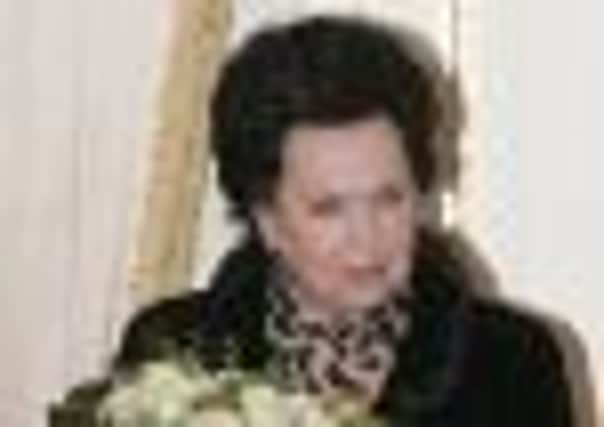Obituary: Galina Vishnevskaya, opera soprano


For two decades Galina Vishnevskaya was the leading prima donna of the Bolshoi theatre in Moscow. With her swept-back, jet-black hair, commanding appearance and powerful voice, Vishnevskaya became a star of the Soviet theatre. She gained international stardom in the 1960s when she and her husband, the cellist and conductor Mstislav Rostropovich, were allowed to make trips abroad to improve the Soviet image in the West. In 1974, however, they were forced into an unexpected exile and were classed as non-persons in their native land.
Initially it was Vishnevskaya’s remarkable vocal range that attracted the Bolshoi. She sang lyrical roles such as Tatiana in Eugene Onegin, various Verdi roles – especially Violetta in La Traviata (which she sang in the original key) – to the hugely demanding Katerina Izmailova in Shostakovich’s Lady Macbeth of Mtsensk. To that she added with a beguiling authority many of Mozart’s most demanding roles.
Advertisement
Hide AdAdvertisement
Hide AdVishnevskaya, even when she made her home in the West, made few appearances in the UK. So Scotland was particularly fortunate to witness her when she was at the zenith of her career. Her visit to the 1961 Edinburgh Festival typified her erratic and somewhat tempestuous nature. Vishnevskaya arrived in Edinburgh to sing at the opening concert, Beethoven’s Missa Solemnnis under Lorin Maazel, with what George Harewood, the festival’s director, wrote in his autobiography, was “only a very inaccurate idea of the score”. Rehearsals in the Usher Hall were fraught, with the other soloists complaining they were granted little time for rehearsal.
Maazel, not always the most accommodating of maestros, restrained his indignation, but at the performance Vishnevskaya delivered a flawless performance and was hailed by The Scotsman critic, Christopher Grier, for her “vital singing”. The soprano also sang concerts with her husband – and memorably gave a free midnight concert in St Cuthbert’s Church.
In 1968, the Festival highlighted the music of Benjamin Britten, and Vishnevskaya took part in an historic performance of Britten’s War Requiem. At the original 1962 performance in Coventry Cathedral, the composer had specially written the work for an English tenor (Peter Pears), a German baritone (Dieter Fischer-Dieskau) and a Russian soprano, Vishnevskaya.
The Soviet authorities at the last minute withdrew Vishnevskaya’s travel visa, and her place was taken by Heather Harper. So, with a keen sense of history, the festival had scheduled a performance of the War Requiem with the three original soloists under Carlo Maria Giulini. It was a triumph, and Britten is on record as considering it “the best performance he had heard.”
In 1975, she returned for a concert under Claudio Abbado and a recital with her husband. Then, the following year she made a striking appearance as an electrifying Lady Macbeth in Verdi’s opera with Scottish Opera. Under Alexander Gibson’s vibrant account of the score, Vishnevskaya delivered a breathtaking brindisi in the banquet scene – musically thrilling and dramatically menacing.
Galina Pavlovna Vishnevskaya was the daughter of an army officer who abandoned his daughter when she was a baby. In her autobiography, Vishnevskaya told how she scraped a living together during the siege of Leningrad and survived tuberculosis. She entered a music college and then sang with local Leningrad companies.
In 1955, she became a member of the Bolshoi Theatre and, over the next two decades, sang all the important soprano roles there and was allowed to tour abroad. In 1961, she appeared at the Metropolitan Opera in New York as Aida and made her debut at Covent Garden in the same role the following year. That was to be the only operatic company, apart from Scottish Opera, with whom she sang in the UK.
Throughout the 1960s, the pair lived next door to Dmitri Shostakovich in Moscow, and the composer wrote the song cycle Satires for the soprano. But Vishnevskaya was becoming used to the vagaries of the Soviet authorities – she also learnt how to avoid the advances of the Soviet premier Nicolai Bulganin.
Advertisement
Hide AdAdvertisement
Hide AdMatters came to a head in 1969 when Rostropovich offered his friend, Alexander Solzhenitsyn, sanctuary from the authorities. Rostropovich refused to climb down and the two were classed as “non-persons”. In 1974, they left Russia and their names were removed from the records of Soviet music.
They rebuilt their international careers and raised funds for their foundation which provides medicine, food and equipment to children’s hospitals in the former Soviet Union and offers bursaries for singers at the Bolshoi.
The power and versatility of Vishnevskaya’s voice is captured on her recordings of Eugene Onegin, Boris Godounov; Tosca, Lady Macbeth of Mtsensk and Prokofiev’s War and Peace. Her forthright autobiography, Galina: A Russian Story, was staged as an opera in 1996.
Rostropovich died in 2007. Vishnevskaya is survived by their two daughters.
Alasdair Steven